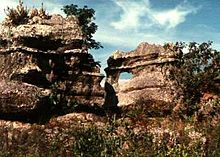Sierra de la Macarena National Natural Park (Parque Nacional Natural Serranía de La Macarena) is a protected natural area of vast grassy plains in the Orinoquía region of Colombia. The park is known for its tremendous biodiversity and naturalists and eco-travelers will find much to appreciate here. Botanists have cataloged more than 2,000 plant species in the park while ornithologists count more than 500 species of bird and entomologists know of more than 1,500 kinds of insects that can bite, sting or annoy travelers. The park is famous for a river called Caño Cristales, which exhibits a spectacular array of colors.

Understand
editThe park covers a vast area of more than 600,000 hectares.
History
editLandscape
edit
The national park is a unique landscape that includes an isolated mountain range where several ecosystems meet. It's a transitional area between the Amazon rainforest, the Andes mountains range, and the highland plains of East Llanos. Within the park, you can find dry forests, mountains and hills with dramatic rock formations, and shrubland savannas as well as river wetlands, including the spectacular Caño Cristales, a river with vivid red, yellow, blue, black and amber waters. Many of the rivers in the park have spectacular waterfalls and tranquil swimming holes.
Caño Cristales
editThe multi-colored river draws shutterbugs looking for the perfect selfie or landscape photo. The river was largely hidden from the Spanish-speaking population until 1969, but is now well known in its own right. The best time to experience the widest range of colors is from the end of July through November. The colors are caused by a plant called Macarenia clavigera that grows after the rainy season. The river flows through the park for 100 km.
Flora and fauna
editThe park is home to a large number of endangered and endemic species found nowhere else on earth: in addition to the previously mentioned 2,000 species of plants (including some 50 species of orchid), 550 species of birds, and 1,200 species of insects, the park is home to more than 100 kinds of reptiles and more than 100 mammal species. The mammals include apex hunters like jaguars and pumas as well as species that are likely to be on the menu for other animals, like deer, capybara, and anteaters. The rainforest sections of the park have eight species of monkey swinging through the trees.
Climate
editGet in
editThe nearest airport with commercial flights is La Macarena (LMC IATA) or Villavicencio (VVC IATA). From Bogota (BOG IATA), there are two flights per day on Avianca and Satena to Villavicencio and once per day on Satena to La Macarena. Other small regional carriers may have flights. Ground transportation to the park or tours can be arranged in Villavicencio, but is best arranged ahead of time. Tour companies in Bogota can arrange all-inclusive trips to the park, which is the easiest way to go and the only recommended way for travelers who don't speak Spanish and are unaccustomed to travel in Latin America. Be aware that the "airport" in La Macarena is little more than a grass landing strip served only by light propeller aircraft.

